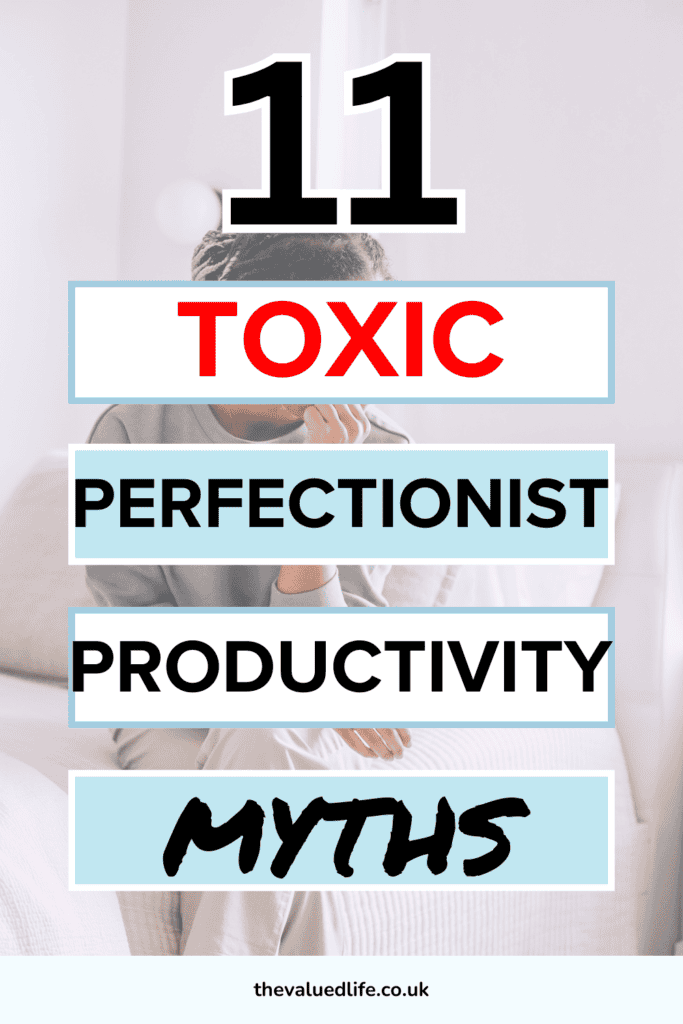11 Perfectionist Productivity Myths You Need To Let Go
It’s time to debunk common perfectionist productivity myths!
As a Mindset and productivity coach for perfectionists, I have seen it ALL. Many of my clients start my sessions with holding tightly onto these productivity myths and it is only through coaching they are able to see the truth of the matter.
Luckily, for you, I have compiled these productivity myths into a nice neat package for you to share with your perfectionist friends.
I cover myths such as ‘perfectionists are more productive’, ‘perfectionism is the same as professionalism’, and ‘perfectionism is the same as having high standards’.
Stay tuned to find out 8 more misconceptions about perfectionism so you can learn how to ACTUALLY be productive without self-sabotaging your success.
This page might contain affiliate links. In the event of a sale, I will be awarded a small commission (at no extra cost for you).
What is a perfectionist?
According to the American Psychological Society, perfectionism is ‘the tendency to demand of others or of oneself an extremely high or even flawless level of performance, in excess of what is required by the situation’.
Here are some signs you might be a perfectionist:
- You have all-or-nothing thinking, things are either great or absolutely terrible
- You tend to overthink the small details of your work
- You procrastinate on tasks because you’re scared of failure
- You go through cycles of go-go-go and burnout
- You tie your self-worth to your career/education/achievements
11 perfectionist productivity myths debunked
Myth 1: Perfectionism leads to success.
You believe that perfectionism will inevitably lead to success so you push yourself to work hard.
Truth: It doesn’t. Your perfectionism will get you to a certain point in your career and education but then it will eventually be the cause of your downfall.
You will start to feel overwhelmed and then push yourself to burnout.
True success comes from consistency and learning from mistakes.
Top Tip: you need to evaluate your values and redefine success in new terms that don’t tie your self-worth to your career/education. Understand that success isn’t about being perfect but about growth and fulfilment.
Journal prompt: how can you redefine success in a way that allows for imperfection?
Myth 2: Perfectionists are more productive.
Truth: That’s just a straight-up lie. You may give off the illusion of being productive because you are constantly overworking yourself but your procrastination, overthinking and lack of delegation will limit your productivity.
You probably waste time focusing on minor details in your projects which delays the needle-moving tasks you NEED to do.
Top Tip: prioritise your tasks based on importance and urgency and set boundaries for task completion.
Journal prompt: when has your perfectionism and attention to detail held you back on a project? What could you have done differently?
Myth 3: perfectionism is the same as having high standards
Truth: it’s not. Having high standards is a good thing, but perfectionists take it to an extreme level.
Your standards are unrealistic and your fear of failure makes you feel anxious, dissatisfied and like you’re never good enough.
Striving for excellence is about having high standards while being flexible and adaptive towards achieving your goals whereas, perfectionism is restrictive and based on control.
Brene Brown, a psychology researcher, describes healthy striving as self-focused and perfectionism as being other-focused in her book The Gift of Imperfection.
Top Tip: Set SMARTER goals, emphasise realistic standards and learn how to see challenges as opportunities for growth.
Journal prompt: how can you set high standards that are realistic and achievable?
Myth 4 Perfection equals productivity
Truth: Perfect work doesn’t exist, and assumes that output is the only metric in productivity which is completely misleading.
In fact, perfectionism actually slows down the process and reduces output in the long term. True productivity is about efficiency, effectiveness and working within your energy limits at a consistent pace.
Top Tip: Focus on getting tasks done to a good enough standard without agonising over the details because you can always make amendments and learn from your mistakes.
I also recommend you learn how to set task completion boundaries so that you don’t let your perfectionism keep you stuck.
Journal prompt: how can you measure productivity in ways other than perfection?
Myth 5 perfectionism is the same as professionalism
This myth assumes professionalism requires perfection in every aspect at work. In fact, it is often seen as an ‘acceptable’ answer in job interviews when asked about your weaknesses.
Truth: professionalism is about reliability, effective communication, high standards and responsibility.
It’s surprisingly easy for perfectionists to ruin professional relationships because they put so much pressure on themselves to be perfect that they overcommit and underdeliver. It also causes so much unnecessary stress.
Top Tip: Communicate clearly (using non-violent communication techniques) and set realistic expectations and deadlines.
Journal prompt: what does professionalism mean to you?
Myth 6 perfectionism is a sign of dedication
Truth: this assumes dedication means perfect work when in fact dedication is all about how you show up in the world. It means resilience, grit, learning from failures, owning up to mistakes and being open to criticism.
You need to put aside your ego in order to be dedicated to a project/cause.
Top Tip: demonstrate dedication by being willing to learn and grow, let go of control and adapt to changes in your project without taking it personally. It’s all about work-life flow.
Journal prompt: how can you demonstrate dedication to an area of your life in a healthy and sustainable way?
Myth 7 productivity is about getting more done
Truth: it is a complete myth that productivity is about busyness and multitasking. Productivity is more about efficiency and effectiveness.
Quality is more important than quantity when it comes to good work.
Top Tip: Develop a mindful productivity system where you work WITH yourself rather than pushing yourself to the brink of burnout. Try to prioritise tasks by using day theming or time-blocking methods.
Journal prompt: what is your tell-tale sign that you are being ‘busy’ rather than productive?
Myth 8 productivity means doing everything yourself
This myth automatically assumes that delegation reduces the quality of work.
Truth: thinking you must work on every task personally leads to burnout, dissatisfaction and resentment. This thinking is the downfall of many of my perfectionist clients.
Effective delegation (emphasis on EFFECTIVE) actually improves teamwork, increases focus and leads to better outcomes.
Top Tip: List your tasks and decide which ones can be delegated. Communicate clearly with your coworkers and take the time to train them on how to complete the task to a good standard. Be empathetic when teaching them the process and acknowledge that learning a new skill takes time.
Journal prompt: what is stopping you from delegating your less important tasks?
Myth 9 you need to be motivated to be productive
This is a VERY common productivity myth about motivation.
Truth: Productivity is based on consistency, habits and discipline, not just motivation. In fact, motivation only plays a small part in productivity despite the hype it often gets.
Top Tip: Create a realistic routine that you can stick to when motivation is low. You can maintain consistency in your workflow by breaking down tasks into small chunks, getting accountability partners and celebrating your small wins.
Journal prompt: what is one small habit you can start today that will help you remain consistent as you work on your goals?
Myth 10 There is a ‘right way’ to do things
Truth: believing there is only one way to do things causes control issues and a struggle to adapt. This mindset will keep you stuck in negative shame spirals when you are unable to meet your unrealistically high standards.
For many perfectionists, anything other than the exact plan is a failure. This mindset will stop you from celebrating your wins and prevent you from seeing the beauty in learning from your mistakes.
Many successful people break the rules in order to achieve new and innovative things.
Top Tip: Experiment with new ways of doing things while making time to reflect and review your approaches. You can also ask your friends and coworkers for their feedback on how you tackle certain tasks.
Journal prompt: describe an unexpected twist in your life that turned out to have a better outcome than expected.
Myth 11 criticism is always negative
You might struggle with criticism because it triggers your limiting belief of not being good enough or being a failure. If you’re a perfectionist, you will go above and beyond burning yourself out and people-pleasing in an attempt to avoid criticism at ALL COSTS.
Truth: criticism doesn’t mean you’re a failure. In fact, constructive criticism is necessary and important for your own growth and development. Feedback will help you improve faster and adapt to changing environments efficiently.
Top Tip: Ask for specific and clear feedback from your peers. Take time to evaluate its validity and find ways to implement the feedback into your new routine.
Journal prompt: how can you reframe your perspective on receiving criticism?
Have you ever believed any of these productivity myths?
Taking the time to work through each of these perfectionist productivity myths is the first step towards increasing your self-awareness and starting your perfectionist healing journey.
By letting go of these myths you will be able to approach productivity with mindfulness, self-compassion and a new healthier definition of success.
Join the community of healing perfectionists
If you would like to receive productivity and self-development tips designed specifically for perfectionists PLUS exclusive coaching offers join my weekly newsletter ‘The Sunday Reset’.
Remember, you are the ONLY person you are going to be with for your whole entire life, so you might as well invest in yourself.
Investing in yourself can be in the form of coaching, courses, reading, journaling, practising self-care and many more things.
Book recommendations for your healing journey
- Atomic Habits by James Clear
- Deep Work by Cal Newport
- 7 Habits of Highly Effective People by Stephen Covey
- The Power of Habit by Charles Duhigg
- Think Like a Monk by Jay Shetty
- The Power of Now by Eckhart Tolle
- How to do the work by Nicole Lepera
Related Posts
- Where Does Perfectionism Come From?
- How To Make Decisions as a Perfectionist – 10 EASY steps
- How To Handle Criticism As A Perfectionist – 9 Simple Ways
- How To Deal With Mistakes as a Perfectionist – 9 Simple Ways!
- 5 energy management techniques to elevate your life
- Work-life flow is better than work-life balance for perfectionists
- STOP Saying These 7 Toxic Perfectionist Phrases To Be Successful
- How to let go of productivity shame and live your best life
- 7 easy ways for perfectionists to increase their self-awareness







